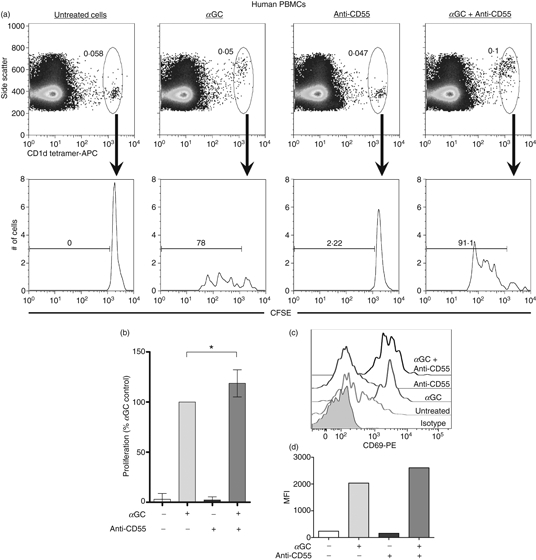Figure 9.

CD55 cross-linking enhances T-cell receptor-mediated human invariant natural killer (iNKT) cell activation. Human peripheral blood mononuclear cells (PBMCs) were labelled with 5 μm carboxyfluorescein succinimidyl ester (CFSE) and seeded into a 24-well plate. Some wells contained a plate-bound anti-CD55 monoclonal antibody (mAb) and some wells received 100 ng/ml α-galactosylceramide (αGC). After 6 days of culture, cells were harvested and stained with allophycocyanin (APC)-conjugated PBS-57-loaded human CD1d tetramer. Using flow cytometry, CD1d tetramer+iNKT cells were gated upon and CFSE dilution was evaluated as a measure of iNKT cell proliferation. Data are representative of four independent experiments yielding similar results (a). The proliferative responses of human iNKT cells from four healthy donors were averaged and graphed. For each donor, treatment with αGC alone served as the response control and was assigned a value of 100% for comparison purposes. The proliferation values resulting from all other treatment groups were expressed as a percentage of the control (b). Human PBMCs were stimulated with αGC and/or a plate-bound anti-CD55 mAb for 6 days, harvested and stained with an APC-eFluor780-conjugated anti-CD3 mAb, APC-conjugated human CD1d tetramer, and a phycoerythrin-conjugated anti-CD69 mAb (open histograms) or isotype control (filled histogram). CD3+ CD1d tetramer+iNKT cells were gated upon and CD69 expression was evaluated as an indicator of iNKT cell activation (c). Mean fluorescence intensity (MFI) values for each treatment group were graphed for one donor (d). Similar results were obtained for three donors.
